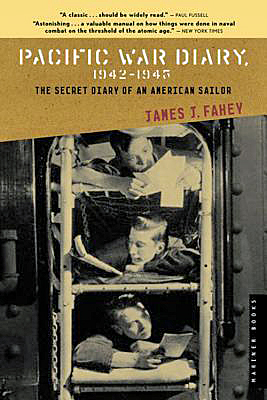 From 1942 to 1945, James Fahey served on board the USS Montpelier, and recorded his experiences in a diary. This was against regulations so he had to go about it secretly; and yet, as Captain Edward L. Beach stated, “We are all gainers from James Fahey’s violation of this rule.” His book, written from the perspective of an ordinary sailor, gives readers a vivid description of life on board a ship during World War II.
From 1942 to 1945, James Fahey served on board the USS Montpelier, and recorded his experiences in a diary. This was against regulations so he had to go about it secretly; and yet, as Captain Edward L. Beach stated, “We are all gainers from James Fahey’s violation of this rule.” His book, written from the perspective of an ordinary sailor, gives readers a vivid description of life on board a ship during World War II.
The value of Fahey’s diary is not its style or artistry but its authenticity and immediacy. There is often little distance between the written words and what they describe. For example, the November 27, 1944 entry, written that same day, records a Japanese air attack on Fahey’s ship. It is a prose-equivalent of the great D-Day scene in the movie Saving Private Ryan. Fahey conveys, effectively and harrowingly, the unrelenting violence of this attack. The roaring planes, about seventy in all, swarm in close, trying to kill with bombs or bullets or torpedoes—or with the planes themselves. It is like something from a Bosch painting: a chaos of smoke and fire and scattered body parts.
Strong and steady as Fahey undoubtedly was, he never talks tough. He is gung-ho without being bloodthirsty; he is realistic without being bitter. The touches of cynicism and sarcasm which appear here and there are lightly articulated; so too his animosity for the enemy. While grim expressions of hatred do occur, Fahey often regards the Japanese fighters with an attitude of grudging respect. And in the end it is not the Japanese people whom he blames for the war but their leaders: “the Military Men”.
As a writer, Fahey was not nearly as good as Joseph Heller (also a veteran of World War II); and yet I prefer Fahey by far. For Heller—in his celebrated novel “Catch-22”—war is simply a farce. The people who run wars are, always and everywhere, venal, callous, clownish meanies, while the people who fight wars are dupes who lay down their lives for nothing and don’t seem to mind doing so. Of course there are millions of war vets who would, to put it mildly, object to such a characterization; ordinary men and women who are proud of their military service but do not write books about it. James Fahey, Seaman First Class, is a striking exception to this rule. Here we have a patriotic, hard-working, non-literary American who, in an almost incidental manner, produced a powerful, historically valuable book.
“Pacific War Diary” became a best-seller but Fahey donated all his earnings to the construction of Our Lady of Dolors Catholic Church in India. Instead of pursuing a literary career, he remained a garbage-truck driver in the city of Waltham, Massachusetts. “It’s an honorable profession,” he said, “and I am happy.”
James J. Fahey died in 1991 at the age of seventy-three. R.I.P.